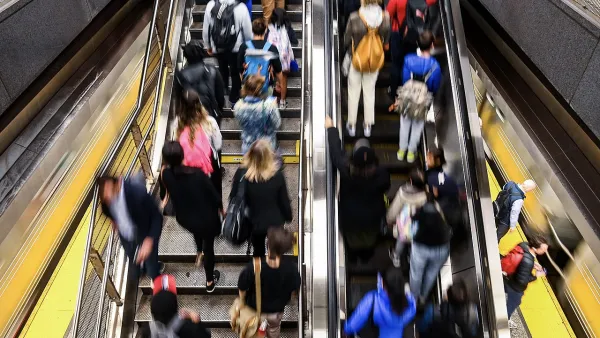Deep cleaning of the New York City subway and bus system is part of the Metropolitan Transportation Authority’s coronavirus response. But it is costly and time consuming, and the public health benefits are not entirely clear.

"The Metropolitan Transportation Authority, the nation’s largest public transit agency, began a rigorous cleaning process at the height of the pandemic as its workers were sickened by the virus and New Yorkers fled the system in record numbers," writes Danielle Muoio.
The cost for the cleanings is expected to reach $500 million a year. The process also involves shutting down the subway each night for four hours. Transit advocates say that money could be better spent, particularly since little evidence shows that cleaning surfaces helps prevent the spread of the coronavirus.
"[Danny] Pearlstein, who opposes the overnight subway shutdown, has said the state-run authority should focus more on increasing service — which would theoretically allow riders to spread out more easily since they could wait for less-crowded trains or buses," adds Muoio.
The MTA says that the cleaning regiment is part of a larger strategy to address the coronavirus and that clean vehicles and stations are helping to draw back riders. Health experts also say that much about the transmission of COVID-19 is unknown and such thorough cleaning could prove beneficial.
FULL STORY: MTA spending to clean trains may be largely cosmetic

Planetizen Federal Action Tracker
A weekly monitor of how Trump’s orders and actions are impacting planners and planning in America.

Chicago’s Ghost Rails
Just beneath the surface of the modern city lie the remnants of its expansive early 20th-century streetcar system.

Amtrak Cutting Jobs, Funding to High-Speed Rail
The agency plans to cut 10 percent of its workforce and has confirmed it will not fund new high-speed rail projects.

Ohio Forces Data Centers to Prepay for Power
Utilities are calling on states to hold data center operators responsible for new energy demands to prevent leaving consumers on the hook for their bills.

MARTA CEO Steps Down Amid Citizenship Concerns
MARTA’s board announced Thursday that its chief, who is from Canada, is resigning due to questions about his immigration status.

Silicon Valley ‘Bike Superhighway’ Awarded $14M State Grant
A Caltrans grant brings the 10-mile Central Bikeway project connecting Santa Clara and East San Jose closer to fruition.
Urban Design for Planners 1: Software Tools
This six-course series explores essential urban design concepts using open source software and equips planners with the tools they need to participate fully in the urban design process.
Planning for Universal Design
Learn the tools for implementing Universal Design in planning regulations.
Caltrans
City of Fort Worth
Mpact (founded as Rail~Volution)
City of Camden Redevelopment Agency
City of Astoria
City of Portland
City of Laramie





























